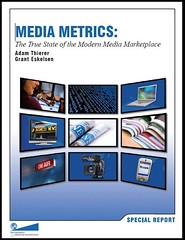Washington Post columnist Harold Meyerson has a truly outrageous editorial in today’s Post comparing Sam Zell, the investor who just took the Tribune Co. private, to a domestic terrorist. Meyerson suggests that Zell belongs behind bars for his attempt to restructure the Tribune’s struggling newspaper business:
On Oct. 1, 1910, a bomb set by James McNamara, an operative of the Iron Workers union, then embroiled in a ferocious dispute with the Los Angeles Times, blew up the Times building, killing 21 pressmen. McNamara was arrested the following April, convicted and later sentenced to life in prison. He died in San Quentin in 1941.
The question for today is: Would a similar sentence be appropriate for Sam Zell? Zell, for those of you fortunate enough not to follow news of the newspaper business, is the Chicago real estate magnate who last year purchased the Tribune Co., which owns the Times, the Chicago Tribune and a number of smaller papers. At the rate he’s going, he’s well on his way to accomplishing a feat that McNamara didn’t even contemplate: destroying the L.A. Times.
This is absurd and insulting on its face since Zell can hardly be equated with someone who engaged in an act of violent terrorism that killed people. Attempting to restructure a struggling business is hardly on par with that. But let’s ignore Meyerson’s ridiculous analogy and instead just look at the facts about what Zell is doing and why he is doing it. Meyerson is apparently oblivious to the fact that the newspaper industry finds itself facing something akin to a marketplace perfect storm. Advertisers are flocking to alternative platforms. Classified ads are being cannibalized by CraigsList and Google. Readers have discovered myriad other media platforms and forms of content to occupy their time. And policymakers still won’t give newspapers an ounce of regulatory relief that might let them restructure their business by partnering with others in their local communities who might help them stay afloat. [I thoroughly documented all of this bad news in part 7 of my ongoing “Media Metrics” series, “An Uncertain Future for Newspapers.” ]
Meyerson is undeterred by these pesky facts and instead shifts all the blame of downsizing at Tribune papers to Zell. Has Sam Zell gone too far in suggesting that papers may need to get slimmer, trim staff, find a way to run more ads, and so on? Some would say yes, and I might even agree with them to some extent. You can’t have great papers without great journalists and editors, after all. And if the whole paper is full of nothing by ads and recycled content, no one will read it.
Others, however, would argue that Zell isn’t going far enough fast enough to retool and restructure for a digital future. Regardless, despite Meyerson’s attempt to paint him as a pariah, Zell is only doing what most industry analysts have suggested must be done–at least in some measure–to keep newspapers alive going forward. And make no doubt about it, the evidence (which is presented down below the fold) makes it clear that newspapers are in serious trouble. Instead of offering even one constructive solution, however, Meyerson inappropriately channels his rage about the demise of the daily paper at a man who is doing his best to make sure that the daily paper will even continue to exist ten years from now. Is that really akin to an act of terrorism? I think not, and shame on Harold Meyerson for suggesting as much.
Incidentally, what I found somewhat ironic about Meyerson’s piece is that he is ranting about what he regards as the over-zealous effort of an individual owner to restructure a private company. (Again, Zell took Tribune private not that long ago). And yet, that model—individual or family ownership of newspaper vs. public / shareholder ownership—is what most media critics claim is part of the salvation for media markets! That is, many media critics constantly complain about “Wall Street pressures” or “shareholder influences” on newspapers and claim that individual or family ownership shelters papers from unreasonable marketplace demands (namely, the need to make money). Well, that theory was always highly dubious as we now see quite vividly with Tribune and other media properties as they go private. Private owners end up taking most of the same steps publicly-owned enterprises do in an attempt to restructure or save their struggling business.
Continue reading →
 Faithful readers will recall that, several months ago, I penned a 7-part “Media Metrics” series that took a hard look at the health of the media marketplace. Today, the Progress & Freedom Foundation is releasing a greatly expanded version of these essays that I have put together with my PFF colleague Grant Eskelsen. In this 100-page special report, “Media Metrics: The True State of the Modern Media Marketplace,” we begin by noting that heated debates about the state of the media marketplace continue to rage in Washington, and opinions seem to range from grim to outright apocalyptic. As we note on pg. 1:
Faithful readers will recall that, several months ago, I penned a 7-part “Media Metrics” series that took a hard look at the health of the media marketplace. Today, the Progress & Freedom Foundation is releasing a greatly expanded version of these essays that I have put together with my PFF colleague Grant Eskelsen. In this 100-page special report, “Media Metrics: The True State of the Modern Media Marketplace,” we begin by noting that heated debates about the state of the media marketplace continue to rage in Washington, and opinions seem to range from grim to outright apocalyptic. As we note on pg. 1:

 The Technology Liberation Front is the tech policy blog dedicated to keeping politicians' hands off the 'net and everything else related to technology.
The Technology Liberation Front is the tech policy blog dedicated to keeping politicians' hands off the 'net and everything else related to technology.